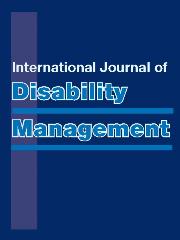Crossref Citations
This article has been cited by the following publications. This list is generated based on data provided by
Crossref.
Matthews, Lynda R.
Bohle, Philip
Quinlan, Michael
and
Rawlings-Way, Olivia
2012.
Traumatic Death at Work: Consequences for Surviving Families.
International Journal of Health Services,
Vol. 42,
Issue. 4,
p.
647.
Matthews, Lynda R
Fitzpatrick, Scott J
Bohle, Philip
and
Quinlan, Michael
2014.
Investigation and prosecution following workplace fatalities: Responding to the needs of families.
The Economic and Labour Relations Review,
Vol. 25,
Issue. 2,
p.
253.
Lamare, J Ryan
Lamm, Felicity
McDonnell, Nadine
and
White, Helen
2015.
Independent, dependent, and employee: Contractors and New Zealand’s Pike River Coal Mine disaster.
Journal of Industrial Relations,
Vol. 57,
Issue. 1,
p.
72.
Quinlan, Michael
Fitzpatrick, Scott J.
Matthews, Lynda R.
Ngo, Mark
and
Bohle, Philip
2015.
Administering the cost of death: Organisational perspectives on workers' compensation and common law claims following traumatic death at work in Australia.
International Journal of Law and Psychiatry,
Vol. 38,
Issue. ,
p.
8.
Matthews, Lynda R.
Fitzpatrick, Scott J.
Quinlan, Michael G.
Ngo, Mark
and
Bohle, Philip
2016.
Bereaved families and the coronial response to traumatic workplace fatalities: Organizational perspectives.
Death Studies,
Vol. 40,
Issue. 3,
p.
191.
Dartnall, Stephanie
Goodman-Delahunty, Jane
and
Gullifer, Judith
2019.
An Opportunity to Be Heard: Family Experiences of Coronial Investigations Into Missing People and Views on Best Practice.
Frontiers in Psychology,
Vol. 10,
Issue. ,
Matthews, Lynda R
Johnstone, Richard
Quinlan, Michael
Rawlings-Way, Olivia
and
Bohle, Philip
2019.
Work fatalities, bereaved families and the enforcement of OHS legislation.
Journal of Industrial Relations,
Vol. 61,
Issue. 5,
p.
637.
Matthews, Lynda R.
Quinlan, Michael G.
and
Bohle, Philip
2019.
Posttraumatic Stress Disorder, Depression, and Prolonged Grief Disorder in Families Bereaved by a Traumatic Workplace Death: The Need for Satisfactory Information and Support.
Frontiers in Psychiatry,
Vol. 10,
Issue. ,
Ngo, Mark
Matthews, Lynda R.
Quinlan, Michael
and
Bohle, Philip
2020.
Information needs of bereaved families following fatal work incidents.
Death Studies,
Vol. 44,
Issue. 8,
p.
478.
Matthews, Lynda R
Quinlan, Michael
Jessup, Glenda M
and
Bohle, Philip
2022.
Hidden costs, hidden lives: Financial effects of fatal work injuries on families.
The Economic and Labour Relations Review,
Vol. 33,
Issue. 3,
p.
586.
2022.
Dealing With Change Through Information Sculpting.
p.
193.
Shaw, Liz
Lawal, Hassanat M.
Briscoe, Simon
Garside, Ruth
Thompson Coon, Jo
Rogers, Morwenna
and
Melendez‐Torres, G. J.
2023.
Patient, carer and family experiences of seeking redress and reconciliation following a life‐changing event: Systematic review of qualitative evidence.
Health Expectations,
Vol. 26,
Issue. 6,
p.
2127.
Jahangir, Mohmad Saleem
Wali, Muzamil
and
Hamid, Wasia
2023.
Death at work in Kashmir: lived experiences of surviving families thereof.
Community, Work & Family,
Vol. 26,
Issue. 1,
p.
76.
Matthews, Lynda R.
Finney Lamb, Cathryn
Jessup, Glenda M.
Ngo, Mark
and
Quinlan, Michael
2024.
Family Accounts of Their Experiences and Expectations of Authorities Following Sudden Workplace Death in Queensland, Australia.
Victims & Offenders,
Vol. 19,
Issue. 7,
p.
1320.


